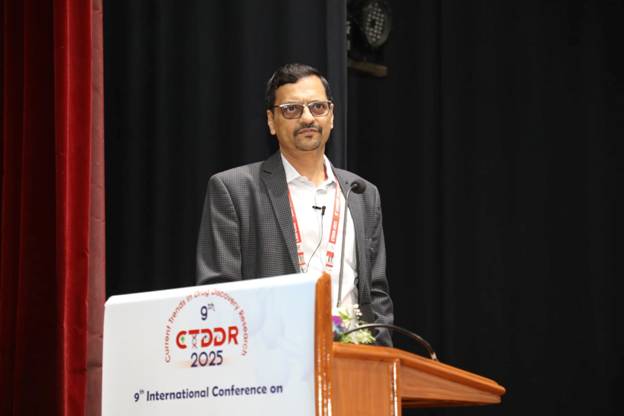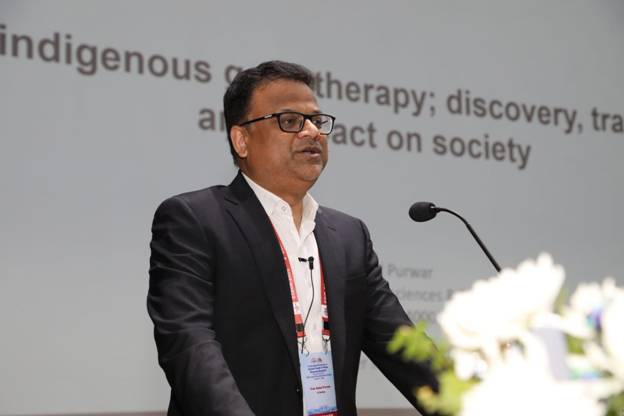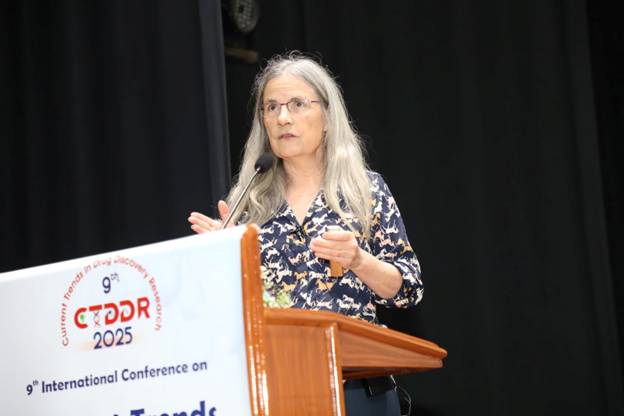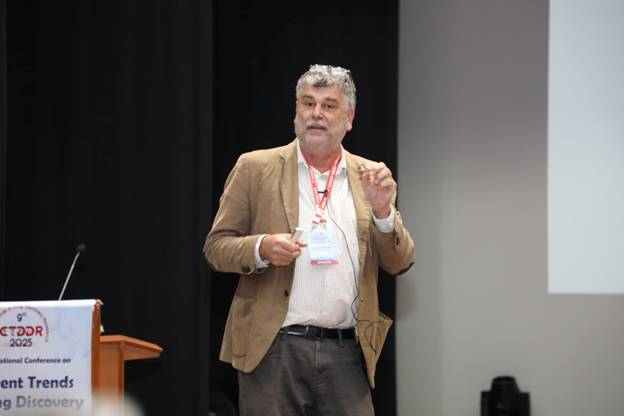Ministry of Science & Technology
Day 2 #CTDDR2025: The 9th MahaKumbh for Drug Research
Drug Resistance, Car T Cell Therapy, Parasitic, Viral disease and Natural Product Chemistry was the main theme of the Day
Experts from different area shared their recent findings with the participants
प्रविष्टि तिथि:
21 FEB 2025 11:35AM by PIB Delhi
The second day of the 9th "International Symposium on Current Trends in Drug Discovery Research” at CSIR-Central Drug Research Institute, Lucknow, observed important scientific deliberations by eminent scientists. Researchers and scholars presented their work through visually compelling posters, fostering discussions and knowledge exchange
Pan-drug-resistant Gram-negative isolates are major risk for life,
novel beta-lactam enhancerwould be helpful to manage the Pan-drug resistant: Sachin S. Bhagwat
In scientific session II on “Concept to point of care: Drugs pending submission/approval or recently approved,” Dr. Sachin S. Bhagwat from the Wockhardt Research Center, Aurangabad, India, delivered his talk on the discovery of a novel mechanism of action-based β-lactam + β-lactam enhancer combination, WCK 5222, with comprehensive coverage of pan-drug resistant Gram negatives. He highlighted AMR has rendered many existing antibiotics ineffective, posing a major global health crisis.The widespread prevalence of MDR, XDR, and PDR Gram-negative pathogens, including carbapenem-resistant strains, has rendered many last-line antibiotics ineffective. The ICMR data shows concerning carbapenem resistance rates: over 90% in Acinetobacter, 45% in P. aeruginosa, and 69% in Klebsiella. As a result, clinicians frequently use medications with diminished safety or unproven combinations. These infections are responsible for up to 8.85 lakh deaths annually, with an additional 9.6 lakh linked to sepsis. Further, he shared his research on the development of a novel β-lactam enhancer, Zidebactam, which, in combination with cefepime (WCK 5222), demonstrated potent activity against 35,000 global pan-drug-resistant Gram-negative isolates. He mentioned that WCK 5222 has saved over 45 lives under compassionate use and completed successful trials in severe documented meropenem-resistant infections and is expected to change the treatment paradigm for life-threatening Gram-negative infections.

Dr. Sachin S. Bhagwat speaking at the 9th "International Symposium on Current Trends in Drug Discovery Research” #CTDDR2025 at CSIR-CDIR, Lucknow.
CAR-T cell therapy is an emerging approach for cancer care: Prof. Rahul Purwar
Prof. Rahul Purwar from the Indian Institute of Technology, Bombay, shared the journey on First “Make in India” CAR-T cell therapy: from R&D to clinic to market. Cancer is a worldwide issue and India has the second-highest cancer mortality rate. The CAR-T cell therapy is an emerging approach for cancer care. However, this technology is extremely expensive (500,000 USD/patient) and not available in India. To ensure its accessibility to all, they developed a robust, safe and affordable technology platform and validated through Phase I and Phase II clinical trials. He further noted that, CD19 CAR-T is approved by CDSCO for commercial use in October 2023, and now over 300 patients are treated across the country.

Prof. Rahul Purwar from IIT, Bombay speaking at the 9th "International Symposium on Current Trends in Drug Discovery Research” #CTDDR2025 at CSIR-CDIR, Lucknow.
Mitochondrial translation can be targeted for new possibilities of new therapeutic development for Apicomplexan parasites borne diseases: Prof. Dominique Soldati-Favre
In her Plenary Lecture on Toxoplasma gondii Mitoribosome from highly fragmented rRNAs to a functional Machine, Prof. Dominique Soldati-Favre from the University of Geneva, Switzerland, shared her research on Toxoplasma gondii Mitoribosome. Apicomplexan parasites are responsible for severe human diseases such as malaria, toxoplasmosis, and babesiosis. She said, these parasites, in addition to small mitochondrial genome, contain fragmented mitoribosomal rRNAs, which complicates our understanding of mitoribosome assembly. Using apicoplast-less T. gondii parasites, they have identified drugs that specifically target mitochondrial translation. This approach offers exciting new possibilities for therapeutic development.

Prof. Dominique Soldati-Favre speaking at the 9th "International Symposium on Current Trends in Drug Discovery Research” #CTDDR2025 at CSIR-CDIR, Lucknow.
HACK-indices provides a rational basis for selecting next-generation probiotics and live biotherapeutic products: Dr. Tarini Shankar Ghosh
Dr. Tarini Shankar Ghosh from The Indraprastha Institute of Information Technology, Delhi, presented the efforts to identify the Health-Associated Core-Keystones (HACK) across population groups. The availability of HACK-indices provides a rational basis for selecting next-generation probiotics and live biotherapeutic products to promote general health. Through global meta-analysis of gut microbiomes from 127 studies, his group investigated 196 taxa for their association with three hallmark properties, i.e., prevalence/community-influence in non-diseased subjects, longitudinal stability and host health and integrated them into a single measure, the HACK-index. Using this HACK-index, they presented a ranking order of microbiome taxa based on their estimated contribution to both microbiome stability and host-health.
Host-directed therapy for infectious diseases may be new hope for targeting antimicrobials: Prof. Christian Doerig
Prof. Christian Doerig from the Royal Melbourne Institute of Technology University, Australia, explained about the host-directed therapy that offers untapped targets limiting cross-resistance to existing antimicrobials and reduced susceptibility to de novo resistance. Using an antibody microarray directed against human signalling proteins, they identified potential antiviral targets as well as lead compounds. He further reported the identification of some erythrocytic kinases that are activated by infection with Plasmodium falciparum. Inhibitors targeting these kinases display high potency against parasite proliferation.

Prof. Christian Doerig speaking at the 9th "International Symposium on Current Trends in Drug Discovery Research” #CTDDR2025 at CSIR-CDIR, Lucknow.
Single-dose liposomal amphotericin B (LAmB) as a game changer in the management of visceral leishmaniasis: Prof. Shyam Sundar
Prof. Shyam Sundar from the Banaras Hindu University, Varanasi, shared the journey of the epidemic of visceral leishmaniasis (VL), starting from its origin to elimination, in India. He emphasized single-dose liposomal amphotericin B (LAmB) as a game changer in the management of VL in India. He noted that the elimination target for VL needs to hold in 2025 to obtain the WHO certification.
The open science discovery of DNDi-6510 led to an orally bioavailable SARS-CoV2 antiviral: Dr. Peter Sjö
In Session IV today, Dr. Peter Sjö from the Drugs for Neglected Diseases Initiative (DNDi), Switzerland, shared about the need for broad-spectrum oral antivirals. He reported the results of the COVID Moonshot, a fully open-science, crowd sourced, structure-enabled drug discovery campaign targeting the SARS-CoV-2 main protease. He further discussed the lead series discovery and approaches to overcome ADMET issues which lead to the front runner preclinical candidate DNDI-6510 against SARS-CoV2.
Novel antivirals to provide immediate therapeutic options against serious viral infections is need of the day: Prof. Sudhanshu Vrati
Prof. Sudhanshu Vrati from the Regional Centre for Biotechnology (RCB), Faridabad, also mentioned the need for the novel antivirals to provide immediate therapeutic options against serious viral infections. As the new viral pathogens are constantly emerging and posing a serious threat of imminent epidemics. He presented the background to the science of antiviral development with an example of a novel antiviral against Chikungunya virus, developed in his lab.
New rapid antigen tests are being developed for dengue, zika and chikungunya: Prof. Gaurav Batra
Prof. Gaurav Batra fromthe Translational Health Science and Technology Institute (THSTI), Faridabad delivered their novel findings on the diagnostics of Arboviral infections, which include, dengue, Zika, and chikungunya. He presented the data on the development of ELISA and rapid NS1 tests with high sensitivity, serotype-independent performance, and significantly improved detection of secondary infections of dengue virus. They are also developing rapid antigen tests for Zika and chikungunya, with the goal of integrating them into a multiplex diagnostic platform. These advanced diagnostics could enhance clinical trial design, patient selection, and treatment evaluation, ultimately contributing to more effective therapeutic strategies and public health responses.
The V Parallel Session of #CTDDR2025 was dedicated on Natural product chemistry for novel drugs.
Prof. Inder Pal Singh from NIPER, SAS Nagar, shared his research on development of wound healing and anti-inflammatory formulations from Seabuckthorn plant Hippophae rhamnoides L. They developed a cost effective method for plant extraction leading to isolation of Seabuckthorn fruit oil (IPHRFH) which showed good wound healing activity and was developed into Cream and Gel formulation.
Dr. Chandra Kant Katiyar from Emami Ltd, Gurgaon, shared his thoughts on new drug discovery from medicinal plants: Issues, challenges and way forward. His talk shared insights into the multifaceted approaches to developing plant-based drugs, covering forward pharmacology, where compounds are screened for biological activity, and reverse pharmacology, which builds on traditional knowledge to validate therapeutic claims. He emphasized that, by integrating traditional knowledge with technology guided by regulations, medicinal plants can continue to be a cornerstone in addressing unmet medical needs globally.
Dr. Ashutosh Pandey from the National Institute of Plant Genome Research (NIPGR), New Delhi, delivered a talk on “Engineering crops for value addition of health-beneficial natural products: From fundamentals to applications”. He presented insights into how plant metabolites regulate, interact with cellular signalling pathways, and modulate gene expression. Additionally, he discussed the regulatory roles of transcriptional factors and their interplay in fine-tuning flavonoid biosynthesis in agriculturally important crops like chickpea and banana. This knowledge can be leveraged for genetic manipulation to enhance the nutritional value of crops.
In the Flash Talks & Poster Session Young Investigators presented their novel findings
In the flash talk session, selected students and young faculty from different scientific fields, related to drug development, delivered their novel findings. In the Poster session today more than 180 posters were presented by the young investigators.
***
NKR/PSM
(रिलीज़ आईडी: 2105196)
आगंतुक पटल : 1031